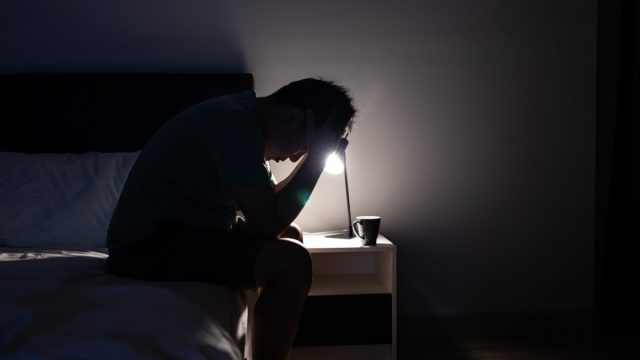Feel Sad at Night? This May Be Why

If you’re kept up at night by feelings of sadness and despair, you may be able to rest a little easier knowing that at least you’re not alone. Plenty of people report feeling blue in the late evening hours, and many find their sleep hindered by their unease.
RELATED: This Uncommon Supplement Can Improve Your Sleep and Mood, Study Says.
According to a recent article in The New York Times, this sudden drop in mood or spike in anguish could be a sign of something commonly referred to as “nighttime depression.”
While people with major depression may notice that their symptoms worsen in the evening hours, it’s not always a direct indicator of a diagnosable mental health condition. Rather, “it’s a sense of sadness,” Theresa Miskimen Rivera , MD, clinical professor of psychiatry at Rutgers University and president-elect of the American Psychiatric Association, told the NYT.
One of the most common causes of these low feelings or nighttime depression is when your circadian rhythm becomes out of sync, the NYT reports.
According to Cleveland Clinic, your circadian rhythm is your 24-hour internal clock, and it’s in charge of telling your body when to wake up and when it’s time to sleep. Light affects this process as well—when it enters your eye, your body knows it can stop making melatonin (the hormone that helps you sleep).
The NYT notes that when your body clock and your sleep-wake cycle aren’t in sync, this can affect your mood. In fact, research suggests that staying up too late or getting up too early can make you feel worse, even if you don’t have a diagnosed mood disorder.
RELATED: 8 Affirmations to Feel Ridiculously Happy Every Day in Retirement.
According to experts from Johns Hopkins Medicine, there’s a bidirectional relationship between depression and poor sleep.
“Depression and sleep problems are closely linked. People with insomnia, for example, may have a tenfold higher risk of developing depression than people who get a good night’s sleep. And among people with depression, 75 percent have trouble falling asleep or staying asleep,” they write.
Several studies have also suggested that staying up into the early morning hours led to progressively lower mood, with one study finding that depressive symptoms were at their worst by 8 a.m.
Practicing good sleep habits can help you mitigate your bedtime blues while also helping to re-establish your circadian rhythm. For instance, turning off electrical devices before bed, setting consistent sleep and wake times, and keeping your room cool and dark can all help you doze off, Sarah L. Chellappa, MD, MPH, PhD, associate professor at the University of Southampton in the U.K., told the NYT.
Because drugs and alcohol can cause depressive symptoms and interfere with sleep, it’s also a good idea to try cutting these out or at least cutting back. Reducing your caffeine could have a similarly calming effect—especially later in the day.
If you’re still feeling sad at night, don’t be afraid to seek help from your doctor or therapist. By helping you get to the root of the problem, you can reset your routine and get the rest and relief you need.